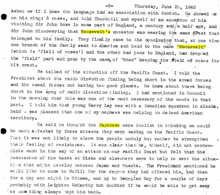 Michelle Malkin’s revisionist telling of the story of the Japanese American internment turns crucially on one supposed military fact: Franklin Roosevelt and his top military brass feared a Japanese assault on the West Coast. This, she claims, rather than prejudice, panic, or economic or political pressure, explained their decision to uproot American citizens of Japanese ancestry from the West Coast, while taking no programmatic action anywhere against identically situated Americans of German or Italian ancestry. And, she argues, it explains why Roosevelt and his Secretary of War and Assistant Secretary of War took so seriously a couple of ambiguous references in top-secret decrypted Japanese diplomatic messages referring to the recruitment of “second generation” Japanese spies.
Michelle Malkin’s revisionist telling of the story of the Japanese American internment turns crucially on one supposed military fact: Franklin Roosevelt and his top military brass feared a Japanese assault on the West Coast. This, she claims, rather than prejudice, panic, or economic or political pressure, explained their decision to uproot American citizens of Japanese ancestry from the West Coast, while taking no programmatic action anywhere against identically situated Americans of German or Italian ancestry. And, she argues, it explains why Roosevelt and his Secretary of War and Assistant Secretary of War took so seriously a couple of ambiguous references in top-secret decrypted Japanese diplomatic messages referring to the recruitment of “second generation” Japanese spies.
Greg Robinson of the University of Quebec at Montreal has pointed me to the excerpt from Canadian Prime Minister MacKenzie King’s diary that you see in this post. It’s from June 25, 1942, and reflects a conversation that King had with Roosevelt in Washington during a meeting of the Pacific War Council. (It doesn’t reproduce clearly on this page; click on it to get a clearer image.)
According to King, Roosevelt “said he thought the Japanese were foolish in thinking we would be much affected by these attacks they were making on the Pacific Coast. That it was not likely to alarm the people unduly but rather to strengthen their feeling of resistance. It was clear that he, himself, did not contemplate much in the way of an attack on our Pacific Coast but felt that the possession of the bases at Kiska [in the Aleutian chain] and elsewhere were to help to meet the situation that might develop between Japan and Russia.”
Admittedly, this is not Roosevelt’s diary; it is King’s. But it is a far, far clearer window into Roosevelt’s thinking about military risks than the suppositions—for that is all Malkin can muster—about which decrypted messages Roosevelt must have seen and what he must have thought they meant in the context of what he must have feared about a Japanese assault on the West Coast.
One other thing: before people start shouting about the American victory at Midway in early June of 1942, and about how the military situation on June 25, 1942 (when he spoke to King) was different from the situation on February 19, 1942 (when he signed the executive order authorizing the military to take action against Japanese Americans and others on the coast), consider this: seven of the ten permanent relocation centers for Japanese Americans in the U.S. interior were not yet open (indeed, had not yet even been built) when Roosevelt talked to King. (Camp opening dates: Granada (Colorado): 8/27/42; Heart Mountain (Wyoming): 8/12/42; Jerome (Arkansas): 10/6/42; Rohwer (Arkansas): 9/18/42; Minidoka (Idaho): 8/10/42; Topaz (Utah): 9/11/42; Gila River (Arizona): 7/20/42.)
Thus, Robinson and I have shown–again–that at the time the government was still developing the bureaucracy and infrastructure of confinement, the Commander in Chief did not himself believe the “military necessity” rationale that Malkin imagines for him.
Comments are closed.